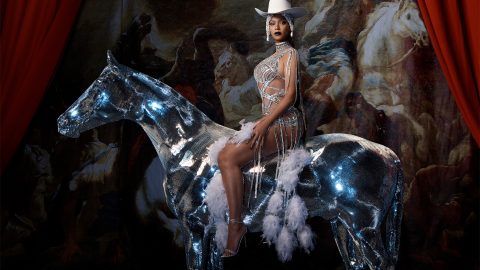
J Noa talks almost as quickly as she raps. Words rattle off her tongue like machine gun fire; she peppers paragraphs together in seconds, her Dominican Spanish instilled with a rhythmic quality that keeps you gripped at all times. According to the 18-year-old Latin rap sensation — whose intricate lyrical flows and fierce self-confidence are attracting legions of fans worldwide — it’s a gift she’s always had.
“It wasn’t intentional,” she says, resting on an armchair in the reception area of a north London studio. “I’ve just always talked quickly. The first time I remember realising I could translate it to music, I was writing a lyric and I intentionally removed the gaps between the words to say it like a complete sentence. I released that and the fans seemed to really like it, so I started trying to use the skill more.”

As the teenage rapper (born Nohelys Jiménez) explains the origins of her style to NME, her interpreter Marcelo keeps pace admirably. J Noa speaks limited English, which only makes her global reception to date even more impressive. Last autumn, a stunning contribution to NPR’s prestigious Tiny Desk Concert series (as part of Latinx Heritage Month) introduced hip-hop fans across the English-speaking world to the self-styled ‘la hija del rap’ (‘daughter of rap’). Aided by her smooth Latin jazz band, she transported the infectious energy of early singles like ‘No Me Pueden Para’ into a fresh live context and prompted viewers to dig back into her catalogue and get to grips with Latin Grammy-nominated debut EP ‘Autodidacta’.
Released in May 2023, ‘Autodidacta’ is defined by ferocious bars and thoughtful storytelling. Its title track is an onslaught of insanely rapid flows, beat switches, and sharp lyrics showcasing J Noa’s socio-political outlook, which is fleshed out in tracks like ‘Qué Fué’, a song “inspired by the injustices of the authorities and by the crime that plagues the entire Dominican territory.” As well as her rapping ability, there’s also an effortless melodicism imparted on tracks like ‘No Me Pueden Par’ and ‘La Niña’, and crucially, each harmony comes from Jiménez herself, with not a single feature on the whole EP.
“I’m part of the hood that now has a voice”
J Noa was only 15 years old when Sony Music first reached out to her; she signed with the major label soon after. In the years since, trips to the US for recording and promo events have become the norm, but she’s been determined not to let the hype get to her, and insists that her creative process has remained the same throughout.
“There hasn’t really been a change, because if you change the recipe you change the final product,” she says. “Since the beginning, this whole process has been really organic, I never try to force creativity. I put in the effort, the hours and the muscle when I go to the studio, and I always go to the studio prepared, but it still has to be an organic process. I leverage each moment where I get inspiration; it could be on the plane or while I’m getting ready, and I’ll stop everything and start making notes. For me, that’s the hack, leveraging each idea and then putting in the effort once I’m in the studio.”

She recalls entering large recording studios for the first time and having to adapt to the new environment, from observing how different producers worked to learning how other artists worked on vocal melodies without having lyrics in place. But it’s worth noting that by this point, she had already been rapping for years.
Jiménez first started spitting bars at the age of eight, freestyling with local boys in the streets of her neighbourhood in San Cristóbal. Her hometown is located 30km west of Santo Domingo, the capital of the Dominican Republic, and her local area — which she recently showed fans around in the video documentary ‘Mi Barrio’ — has greatly impacted her capacity for storytelling, the poverty and struggle she saw firsthand giving her a greater sense of perspective from an early age. As she raps on ‘Betty’, the heart-rending tale of a young, vulnerable teenage girl from the hood who unexpectedly winds up pregnant, “a ustedes le sorprende para mí es normal” (“You are surprised, for me it’s normal”).

“I witnessed all of that in the flesh,” she tells NME. “I was just telling the story, so there wasn’t really pressure. But once it was out, I felt that feeling; I started seeing comments and seeing people realise what ‘Betty’ was about, and when I detect pressure I feel that I have to lead by example. If I’m going to tell these kinds of stories and bring light to these problems, I can be part of the problem. If I’m making a rap about being an educated person and here in the interview I portray myself as being an uneducated person, that’s not being consistent, so I need to be true and lead by example.”
This reflects Jiménez’s belief that rappers are “the journalists of the hood”. It’s a viewpoint she backs up consistently in her music, which explores a wide range of pertinent issues relating to social inequality, politics, relationships, and mental health, all of which she feels a responsibility to document. Her recent single ‘Era de Cristal’ is a good example. Its video displays Jiménez confined in a box bedroom, tossing, turning and visibly struggling to keep it together, these visuals reflecting lyrical content that centres around anxiety and insomnia, with lyrics like “mirando como cae la noche el cielo, una lágrima que adorna mi cara y rueda y mi cuello” (“watching the night fall into the sky, a tear adorns my face and rolls down my neck”).
“What I do, it comes out of my heart”
“I’m not afraid to touch any topic at all,” she explains. “But in previous songs, I had never been so open about mental health. I wanted to give something to my fans, giving another side of myself and being a little bit exposed in that sense.”
“Rap is history,” she continues. “History needs to be told, and where I come from, the hood, there was a lack of a voice. There were stories, but no one to tell those stories. I’m part of the hood that now has a voice, and I want to use that voice to tell those stories. With my genre, with my skills, I’m capable of bringing light to these narratives.”
This attitude is a central facet of her forthcoming debut album (due out May 23), ‘Matanse Por La Corona’ (‘kill for the crown’). Produced largely by Honduran-born, LA-based producer Trooko – “he’s a master,” says Jiménez – the album leans heavily on recrafted jazz and soul melodies, from the neat double bass riff that opens ‘Cenicienta’ to the coarse Chubby Checker vocal sample that’s chopped-up and scattered across the tough hip-hop track ‘Arrogante’. Mirroring the figurative violence of its title, ‘Matanse Por La Corona’ sees her spit rapidly against an intense, jumpy beat centred on tight, triumphant bursts of horns that evoke the open credits of a 1960s detective drama (they’re sampled from Canadian composer Dennis Farnon’s 1974 track ‘Snowmobile’). What was the intention behind that evocative album title?

“The point is to acknowledge that I’m not working towards this objective [of ‘killing for the crown’]. It’s not something that matters to me, having that recognition or fame,” she says. “I’m doing this because it’s what I like, I’m working on my own agenda, with my own goals of growing as an artist. I’m telling everyone that they can kill for the crown, but that’s not my agenda, I will be here doing my own thing!”
Perhaps it’s this singularity, this lack of regard for petty beef, commercial success or the trappings of fame, that makes J Noa such a likely candidate to rise to the top. Posing for her NME shoot against a deep red backdrop, her hair braided and fashioned into a majestic floral shape above her head, she exudes the energy of a star. She seems comfortable, staring down the camera, and shuffling with ease to the light reggaeton beats that blast from a speaker by the side of the studio.
The following day, she jumps onstage at renowned Camden venue Electric Ballroom to support Venezuelan funk/soul four-piece Rawayana, and stomps around with the same assured self-confidence. For an 18-year-old, Jiménez has a formidable stage presence and command of the room; she strides around with purpose, and the mostly Spanish-speaking crowd respond fervently to bold lyrics like “Piden guerra, pero vienen sin bala no hay quien resista / A una barra que te deja en coma el tiempo que tú exista” (“They ask for war, but they come without bullets, there is no one to resist / To a bar that leaves you in a coma for as long as you live”). You get the feeling she was built for this.
“Rap is a lifestyle,” she says. “I’m pure hip-hop. There are many ways to do hip-hop, but for me it’s about focusing on the lyrics while also being a bit aggressive. It comes from my personality; I’m bold, I’m aggressive, and I want to represent that I am a strong Black woman. What I do, it comes out of my heart.”
J Noa’s debut album ‘Matanse Por La Corona’ is released May 23
Listen to J Noa’s exclusive playlist to accompany The Cover below on Spotify and here on Apple Music
Words: Fred Garratt-Stanley
Photography: Fiona Garden
Hair: Shamara Roper
Stylist: Vivian Nwonka
Assistant Stylist: Christel Kwapong
MUA: Hila Karmand
Assistant MUA: Cassandra Scalia
Label: Sony Music
The post J Noa: “Rap is history, and history needs to be told” appeared first on NME.





